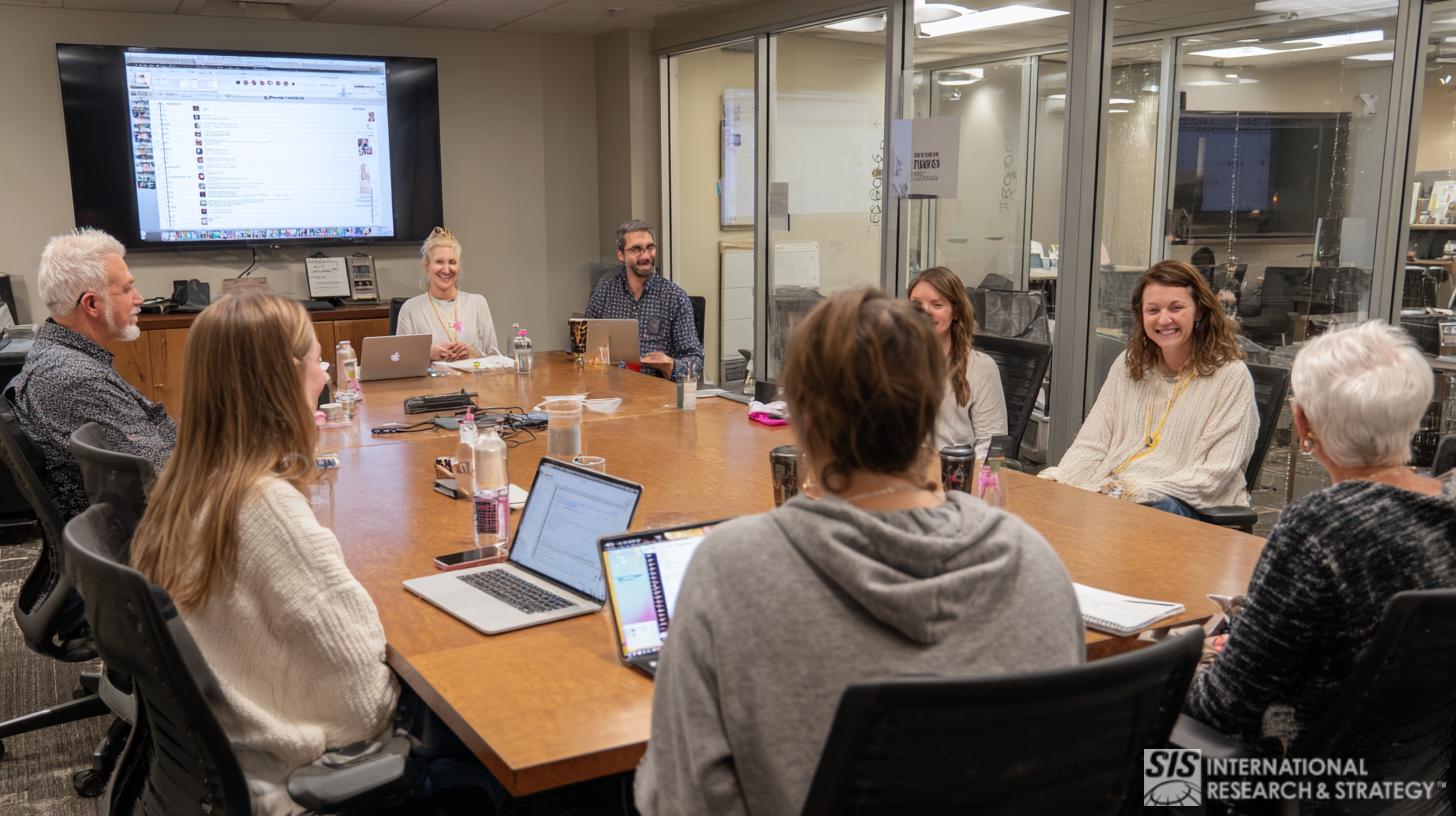B2B Market Research

Leveraging B2B market research ensures that your company stays ahead of emerging trends and customer needs, driving long-term growth.
How do you make strategic decisions in your business? The most successful companies rely on B2B market research to fuel their strategic planning.
What is B2B Market Research?
B2B market research studies the factors influencing one business to engage, partner, or purchase from another. It encompasses procurement practices, supplier evaluation criteria, and corporate partnership dynamics. So, by deciphering these complex networks, B2B market research provides critical insights into businesses’ collaborative environments, helping them navigate complex B2B ecosystems effectively.
But… Why Is B2B Market Research Necessary?
B2B market research ensures that businesses remain attuned to industry benchmarks, are aware of best practices, and can identify potential red flags or opportunities in their B2B interactions. Moreover, as businesses constantly evolve their offerings and operations, this market research acts as a proactive tool, ensuring firms remain aligned with their business partners’ shifting needs and preferences.
B2B market research helps companies to gain valuable information about:
- Economic shifts
- Competitors
- Current market trends
- New opportunities
- Customer insights
B2B market research also helps businesses identify new development opportunities and threats quickly. It can also help companies to uncover their USP. Companies think about their competitive advantage and create advantages that competitors cannot easily replicate. B2B market research companies often test products, ads, services, and market opportunities for the following outcomes:
- Desirability: A product or service must be desirable, or the market will not create demand for it.
- Distinctiveness: Customers should be able to tell the company’s product offerings apart from those of other players in the market
- Defensibility: B2B market research companies must be able to deter or prevent competitors from replicating strategic advantages.

What Are the Main Benefits of B2B Market Research for Businesses?
Delving into B2B market research has several benefits for businesses, regardless of size or sector. Here are some of the standout advantages:
- Informed Decision-Making: With B2B market research, companies gain deeper insights into industry trends, competitor benchmarks, and partner preferences.
- Risk Mitigation: B2B market research highlights potential pitfalls in business partnerships, such as unreliable suppliers or unsustainable pricing structures.
- Strengthened Partnerships: Through understanding business partners’ needs, challenges, and expectations, B2B market research allows companies to tailor their offerings and interactions to better align with their B2B counterparts, fostering more substantial and more fruitful partnerships.
- Identification of New Opportunities: Businesses can spot emerging trends, untapped market segments, or innovative solutions that could shape the future of their B2B relationships.
- Improved Product Development: Market research helps companies understand other businesses’ specific needs and preferences. These insights can be instrumental in refining existing products or services or innovating new solutions that address precise market gaps.
- Enhanced Competitive Positioning: With insights from B2B market research, businesses can identify what sets them apart in the marketplace.
- Optimized Marketing and Sales Strategies: Tailoring messages that resonate with a B2B audience requires a deep understanding of their pain points, goals, and decision-making processes. B2B market research provides nuanced insights to shape compelling marketing campaigns and sales pitches.
… Of Course, It Has Disadvantages
- Cost and Time-Intensive: Conducting comprehensive B2B market research can be resource-intensive in terms of time, money, and personnel, particularly for small and medium-sized enterprises (SMEs) with limited budgets and manpower.
- Complexity and Uncertainty: B2B markets are often complex and dynamic, with multiple stakeholders, long sales cycles, and evolving industry dynamics, making obtaining accurate and reliable data challenging.
- Data Quality and Bias: Ensuring the quality and integrity of data collected in B2B market research can be challenging, as biases, inaccuracies, and incomplete information may skew findings and lead to flawed decision-making.
- Overreliance on Research Findings: While market research provides valuable insights, businesses must be cautious about relying too heavily on research findings at the expense of intuition, creativity, and strategic vision.
- Limited Predictive Power: Despite efforts to forecast market trends and anticipate future developments, B2B market research inherently carries a degree of uncertainty, and predictions may not always align with actual outcomes.
Best Practices for Effective B2B Market Research

To maximize the impact of B2B market research and drive strategic decision-making, businesses should adhere to a set of best practices:
- Clearly Define Objectives: Outline research objectives aligned with business goals and key performance indicators (KPIs). Clarity of purpose is essential for guiding the research process, whether entering a new market, launching a new product, or assessing customer satisfaction.
- Utilize a Mix of Qualitative and Quantitative Methods: Combine qualitative methods such as in-depth interviews, focus groups, and ethnographic research with quantitative techniques like surveys, data analytics, and statistical analysis.
- Segmentation and Targeting: Segment the target market based on relevant criteria such as industry, company size, geographic location, and purchasing behavior.
- Continuous Monitoring and Feedback: Establish mechanisms for continuously monitoring market trends, competitor activities, and customer feedback.
- Investment in Technology and Tools: Leverage advanced technologies and tools such as CRM systems, data analytics platforms, and survey software to streamline the research process, automate data collection, and generate actionable insights. Investing in the right technology infrastructure enhances research efficiency and effectiveness.
- Cross-Functional Collaboration: Foster collaboration between different departments within the organization, including marketing, sales, product development, and customer service.
- Ethical Considerations: Respect customer privacy, obtain consent for data collection, and ensure the confidentiality and security of sensitive information. Maintaining ethical practices builds trust with customers and enhances the credibility of research findings.
Our Current Market Review and Recommendations
At SIS International, we believe that B2B market research is a powerful tool for guiding strategic decisions in today’s competitive environment. After conducting an extensive analysis of the current market landscape, we recommend that companies focus on emerging opportunities in sectors experiencing rapid growth, such as technology and sustainability. In these areas, businesses can leverage B2B market research to identify untapped market potential and better understand shifting consumer preferences.
B2B Market Research Methods
B2B market research often involves more complex methodologies than B2C research due to the nature of B2B transactions and the smaller size of the target audience. Standard B2B market research methods include:
- Surveys and Questionnaires: Surveys and questionnaires are key tools for gathering quantitative data from B2B stakeholders. These can be administered online, via email, or through direct mail, and may focus on topics such as customer satisfaction, product preferences, and market trends.
- Interviews: In-depth interviews with key stakeholders, including decision-makers, influencers, and end-users within B2B organizations, provide qualitative insights into their needs, challenges, and purchasing behaviors. Interviews can be conducted in person, over the phone, or via video conferencing.
- Secondary Research: Secondary research involves gathering and analyzing data sources such as industry reports, market studies, academic publications, and government publications. Secondary research provides valuable context and background information to supplement primary research efforts.
- Competitor Analysis: Analyzing competitors’ products, pricing strategies, marketing tactics, and market positioning helps businesses understand their competitive landscape and identify opportunities for differentiation and competitive advantage.
- Observation: Observational research involves directly observing B2B stakeholders in their natural environment, such as trade shows, industry events, and customer interactions. Observational research provides valuable insights into behavior, preferences, and trends.
- Expert Panels: Expert panels bring together industry experts, thought leaders, and practitioners to discuss and provide insights on specific topics relevant to B2B market research. They offer diverse perspectives and expertise, enhancing the depth and breadth of research findings.
- Focus Groups: Focus groups involve facilitated discussions with a small group of B2B stakeholders, allowing in-depth exploration of opinions, attitudes, and perceptions. Focus groups can uncover insights that may not emerge through other research methods.
The Role of Focus Groups in B2B Market Research

Purchasing Processes
- Motivation to buy
- Drivers of brand loyalty
- Unmet customer needs
- Product Development
- Marketing message testing
- New Concept Testing
- Customer Satisfaction
- Pricing & Willingness to Pay
- Preferences, Likes and Dislikes
- Packaging insights
- Competitive Intelligence
B2B Focus Groups encourage deep thought, fresh thinking, and idea generation. A Focus Group brings between 8 and 10 B2B decision-makers to a focus group facility. Respondents provide qualitative insight on questions that matter to you. This qualitative research method can inform subsequent quantitative and strategic research projects.
A moderator guides and stimulates the discussion. The moderator raises questions from a “Discussion Guide” to ask the group and will participate in briefings with the client.
Focus Group Recruitment involves getting respondents to participate. Recruitment is essential as B2B markets can be niche, and professionals can be busy. The recruitment process can also yield insights. We recruit people from many industries, including IT decision-makers, procurement directors, and R&D managers.
Online Focus Groups
The Online Focus Group is a method in which respondents and the moderator discuss topics via audio, video, or chat. Clients can also observe in real-time. B2B professionals are busy, and this method can be more convenient.
Another advantage of the online focus group is that it can assemble respondents over vast geographies, which can be particularly helpful in specialized, niche industries. Online Groups can be a cost-effective, convenient, and efficient way to generate qualitative insight.
Online Insight Communities
Digital Communities are rapidly rising in popularity in B2B research. Like a social network, respondents log in to respond to posts, exercises, polls, prompts, and discussions. These generally run for 2-4 days, allowing for more candid, in-depth conversation. Respondents can log on at their convenience for 10-30 minutes per day as long as they participate within the specific days of the study. Another advantage is that these digital platforms allow for further analysis with advanced text analytics, automated transcripts, and user statistics that can add more data to the qualitative findings.
Largest Growing Segments in B2B Market Research

The B2B market research industry is experiencing significant growth across several key segments, driven by technological advancements and businesses’ evolving needs. One of the fastest-growing segments is the technology sector, where research on AI, machine learning, and cybersecurity is in high demand. Companies in this space invest heavily in B2B market research to understand technological trends, consumer expectations, and potential risks, allowing them to innovate and stay competitive.
Another rapidly expanding segment is sustainability and green technologies. As environmental concerns rise globally, businesses are seeking B2B market research to help them navigate the shift toward more sustainable practices. This segment includes research on renewable energy, eco-friendly product development, and corporate social responsibility (CSR), helping companies align with changing consumer preferences and regulatory requirements.
Healthcare and life sciences also represent a large and growing segment in B2B market research. With the rise of personalized medicine, biotechnology, and digital health, businesses in this field require deep insights into patient needs, technological advancements, and regulatory challenges to succeed in an increasingly complex market.
B2B Market Drivers
| Market Driver | Description |
|---|---|
| Technological Advancements | Innovations such as automation, cloud computing, and artificial intelligence enhance operational efficiency and enable new business models. |
| Globalization | The expansion of businesses into international markets drives demand for B2B services and solutions that facilitate global operations and compliance. |
| Digital Transformation | The shift towards digital solutions and platforms increases the need for B2B services that support digital integration, data management, and cybersecurity. |
| Economic Conditions | Economic growth or downturns influence B2B purchasing behavior and investment in products and services, affecting overall market demand. |
| Regulatory Changes | New and evolving regulations impact how businesses operate, creating demand for B2B services that ensure compliance and manage regulatory risks. |
| Increased Competition | As competition intensifies, businesses seek B2B solutions that offer competitive advantages, such as enhanced efficiency, cost reduction, and innovation. |
| Demand for Customization | Businesses increasingly require tailored solutions that meet specific needs, driving demand for B2B services and products that offer customization and flexibility. |
| Focus on Sustainability | Growing emphasis on sustainability and environmental responsibility prompts businesses to seek B2B partners that offer eco-friendly solutions and practices. |
| Consumer Behavior Shifts | Changes in end-user expectations and behaviors influence B2B market demand, driving the need for solutions that align with evolving consumer trends. |
Opportunities in B2B Market Research
The B2B market research industry presents numerous opportunities for businesses to leverage insights for strategic growth and competitive advantage. Recognizing and capitalizing on these opportunities can significantly enhance a company’s market position. Here are some key opportunities in the field:
- Integration of Advanced Technologies:
- The adoption of emerging technologies, such as AI, machine learning, and big data analytics, offers new opportunities to enhance the accuracy and depth of B2B market research.
- The adoption of emerging technologies, such as AI, machine learning, and big data analytics, offers new opportunities to enhance the accuracy and depth of B2B market research.
- Expansion into Emerging Markets:
- As global markets continue to grow, particularly in regions like Asia-Pacific and Latin America, there is a significant opportunity for B2B market research to help companies understand and penetrate these emerging markets.
- As global markets continue to grow, particularly in regions like Asia-Pacific and Latin America, there is a significant opportunity for B2B market research to help companies understand and penetrate these emerging markets.
- Personalization and Customization:
- Companies can capitalize on this by offering tailored B2B market research services that address specific industry needs, customer segments, and business objectives, providing more relevant and actionable insights.
- Companies can capitalize on this by offering tailored B2B market research services that address specific industry needs, customer segments, and business objectives, providing more relevant and actionable insights.
- Increased Focus on Sustainability:
- With rising environmental awareness, businesses are seeking B2B market research to understand and implement sustainable practices.
- With rising environmental awareness, businesses are seeking B2B market research to understand and implement sustainable practices.
- Enhanced Data Visualization and Reporting:
- The development of advanced data visualization tools provides an opportunity to present B2B market research findings in more interactive and understandable formats.
How SIS International’s Market Research in B2B Market Research Helps Businesses
At SIS International, we understand the critical role that B2B market research plays in shaping successful business strategies. Our research services provide a range of benefits designed to enhance your strategic planning and drive growth. Here’s how our market research can support your business:
- Enhanced Strategic Planning:
- Our comprehensive B2B market research equips businesses with the data to make informed strategic decisions. We help you develop well-founded strategies that align with market opportunities and challenges.
- Our comprehensive B2B market research equips businesses with the data to make informed strategic decisions. We help you develop well-founded strategies that align with market opportunities and challenges.
- Increased Revenue:
- Leveraging our insights allows businesses to identify new revenue streams and optimize their offerings. Understanding market demand and customer preferences through B2B market research can lead to more effective product launches, pricing strategies, and marketing campaigns, driving higher revenue.
- Leveraging our insights allows businesses to identify new revenue streams and optimize their offerings. Understanding market demand and customer preferences through B2B market research can lead to more effective product launches, pricing strategies, and marketing campaigns, driving higher revenue.
- Risk Reduction:
- SIS helps mitigate risks by providing a detailed analysis of market conditions and potential challenges. By anticipating changes and understanding market dynamics, businesses can make proactive adjustments to reduce uncertainty and navigate potential pitfalls.
- SIS helps mitigate risks by providing a detailed analysis of market conditions and potential challenges. By anticipating changes and understanding market dynamics, businesses can make proactive adjustments to reduce uncertainty and navigate potential pitfalls.
- Improved Marketing Efficiency:
- With targeted B2B market research, businesses can refine their marketing strategies to better reach and engage their target audience. Our insights enable you to tailor your messaging, optimize channel strategies, and enhance marketing effectiveness.
- With targeted B2B market research, businesses can refine their marketing strategies to better reach and engage their target audience. Our insights enable you to tailor your messaging, optimize channel strategies, and enhance marketing effectiveness.
- Accelerated Growth and Innovation:
- Access to up-to-date market data and trends accelerates growth by highlighting new opportunities and areas for innovation. Our research supports your efforts to stay ahead of industry developments and leverage emerging trends for competitive advantage.
- Access to up-to-date market data and trends accelerates growth by highlighting new opportunities and areas for innovation. Our research supports your efforts to stay ahead of industry developments and leverage emerging trends for competitive advantage.
- Boosted ROI:
- Investing in our B2B market research delivers a strong return on investment. Our research provides actionable insights that drive better decision-making and strategic execution.
Our Facility Location in New York
11 E 22nd Street, Floor 2, New York, NY 10010 T: +1(212) 505-6805
About SIS International
SIS International offers Quantitative, Qualitative, and Strategy Research. We provide data, tools, strategies, reports, and insights for decision-making. We also conduct interviews, surveys, focus groups, and other Market Research methods and approaches. Contact us for your next Market Research project.

